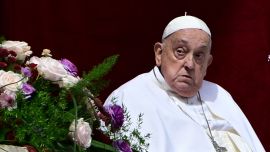A series of statements by a veteran business leader this week epitomise the drama facing many Argentines this year. His name is Héctor Méndez. He owns a plastic containers business and he has been the president of the Argentine Industrial Union (UIA) three times over the last few years.
“The [Mauricio] Macri government has been a total failure,” Méndez said in a radio interview this week. “The manufacturing sector was better off with the previous government.” He continued, “I regret having voted for him. In a way I was an accomplice to his victory. Now I look at the state of the country and I get depressed: we are an economic and political disaster, it’s as if we had no future.”
But hang on, there’s a punchline coming that defies logic. Asked who he would vote for in the (likely?) event of a second round run-off vote between President Mauricio Macri and former president Cristina Fernández de Kirchner, he did not hesitate. “I would vote for Macri,” he declared.
Roughly half of Argentine voters, according to most of the polls that are circulating in public and in private, feel like Méndez. Placed at a crossroads, having to choose between Macri and CFK in a November second round ballot, they would reluctantly pick one. But mostly, they are hoping that day never comes.
Sergio Massa knows that too. That is why he threw a perfectly orchestrated rally on Tuesday, April 2, presenting his “10 commitments for Argentina” in an hour-long speech at the premises of the Argentine Rural Society (RSA) in Palermo. It was a decalogue that mimicked a governing platform for a presidential candidate.
At this early stage in the race, Massa is on a shortlist of five people who are likely to be the next president of Argentina, competing with former economy minister Roberto Lavagna and Juan Manuel Urtubey, the governor of Salta, to make it to the final face-off.
“My place will be defined by votes,” said Massa in Palermo, subtly attempting to put pressure on Lavagna to agree to a primary, in order to settle who will be the main ‘anti-polarisation’ contender. However, the veteran economist and politician wants nothing to do with that idea. He wasted no time in responding: “Massa and I are on different political tracks. He is running for a party candidacy; I am looking for the consensus to govern the country.”
If logic prevails – which is not always the case in Argentine politics, lest we forget – Lavagna, Massa and Urtubey should reach an agreement to fill the empty space in an efficient manner. If they do, one of them might win the next election. If they don’t, they run the risk of none of them qualifying for the second round and missing out on a seemingly unique political opportunity.
And yet still, these still potential candidates believe they have a wild card up their sleeve. What if, people in their ranks repeat, Fernández de Kirchner decides not to toss her hat into the race? This is the biggest outstanding riddle in the current political scenario, one that has Peronists of all factions scratching their heads. Only CFK knows. Does she?
According to people in her entourage, the former president is deeply moved by the health and condition of her daughter, Florencia, who is suffering from post-traumatic stress and receiving medical treatment in Cuba. The 28-year-old is, like her mother and her elder brother Máximo, facing court investigations on alleged money-laundering charges – yet she is the only one among them who does not enjoy immunity from jail as a sitting member of Congress (Cristina is a senator and Máximo a deputy).
The only thing that will make Cristina Fernández de Kirchner change an otherwise sure and set political course toward her third presidential candidacy is a deterioration of her daughter’s situation, either in medical or legal terms. Florencia is in trouble: if she stays in Cuba, she would be declared in contempt of court; if she comes back, she faces a potential prison sentence. Her mother is aware of the trap the family faces.
Peronist bigwigs, meanwhile, are not indifferent to the former president’s apparent hesitation. One of the rising stars in the Peronist world, San Juan Governor Sergio Uñac, said after winning his province’s primaries by a landslide last Sunday that “the Macri government wants Cristina to run; it would be silly to do them the favour.” The governor of Chaco, Domingo Peppo, said that if the ex-president ran, he would support her, but he added notably that “the Peronist unity process would be easier if she didn’t run.” They both are openly supporting Lavagna.
Even Cristina’s staunchest supporters are growing
anxious about her dragging her feet about her candidacy.
The clock is ticking toward June 22, the deadline for registering
candidacies. The ball is entirely in her court, and she might
have to swing it back soon.related news




















Comments